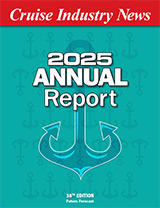 Some countries in Europe continue to be strong despite the economic and political challenges that much of Europe is facing. Other countries, especially in Southern Europe, may be on the verge of economic collapse, as a sea of challenges keeps coming.
Some countries in Europe continue to be strong despite the economic and political challenges that much of Europe is facing. Other countries, especially in Southern Europe, may be on the verge of economic collapse, as a sea of challenges keeps coming.
Meanwhile, the cruise passenger capacity for 2012 for ships sailing in Europe is approximately 5.7 million, up 5 percent from 5.4 million in 2011, compared to a 9 percent increase from 2010 to 2011.
While deployed cruise capacity is an indication of market health, the true diagnosis will come when the publicly held companies report their third quarter earnings. There is a difference between filling ships and filling ships at profitable rates.
Have contingency plans become the rule rather than the exception? The big upset this year was, of course, the grounding of the Costa Concordia, and if that did not hit Costa and the industry hard enough, only weeks later the Costa Allegra suffered a crippling engine room fire for yet another round of negative press coverage.
The cruise industry has subsequently stepped up its offensive both in North America and Europe and announced a number of proactive safety measures, and the European Cruise Council (ECC) has been working hard with European institutions to make sure they understand that the recent incidents are not commonplace, according to Robert Ashdown, director of technical affairs, environment and operations for the ECC.
“We need to make sure that when governments look at the need for further regulations, they have the full picture,” he said.
Currently, the whole gamut of environmental issues is alsol on the table.
“We would like to see that any regulation that comes through is practical and achievable,” Ashdown said, “including labor affairs, and health and hygiene issues, which affect all global operators.”
Financial analysts are taking a cautious approach for the near term. According to Goldman Sachs, following a massive surge in European capacity, cruise lines may have to wait for customers and pricing to catch up.
There is a lot of uncertainty surrounding the situation in Greece and by implication in Spain, Portugal, Ireland and, perhaps most important, Italy, according to David Leibowitz, research analyst at Horizon Kinetics in New York. While new ship launches and special events help create publicity, the issue that consumers are struggling with, he said, is what their situation will be like six to eight months from now.
In the UK, David Selby, managing director of Travelyields, a travel consulting firm, said that people are concerned about their jobs and are careful about how they spend their money. He said he has never seen such low prices on cruises, which he attributed to late bookings, and “if the market was better, the deals would not be there.”
But there is light at the end of the infamous tunnel. Based on historical models, Leibowitz said the next few years will see European markets turn around – helped by a slower newbuild pace and the retirement of older tonnage.
Excerpt from Cruise Industry News Quarterly Magazine: Summer 2012



